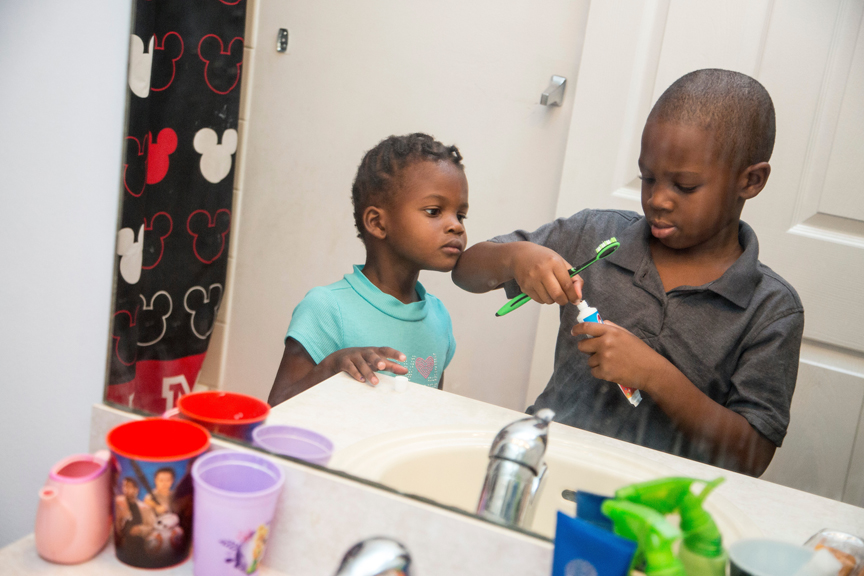- Behavior
- Parenting
- Safety
Start letting go to build your tween’s skills for self-sufficiency

In this article, you’ll find answers to questions like:
1. Am I overprotecting?
2. When to teach independence?
3. How to balance their independence?
Learning begins at birth.
By two to three months, we expect babies to hold up their heads; by six months, to hold their own bottle. Every day we proudly post on social media new acts of independence. Our eyes dance with pride when they learn to go potty, tie their shoes and recite their ABCs.
1. AM I OVERPROTECTING?
As children embrace their independence, some parents aren’t ready to let go, so regression sets in.
“Children begin learning life skills very early, but parents underestimate how much they can learn and how soon,” says Dorothea Daniels, former coordinator of Wyman’s Teen Outreach Program, known as TOP, at Children's Home Society of Florida in West Palm Beach. “Parents also tend to limit what kids and teens are exposed to because of their own discomfort with certain subjects, and this is detrimental to them in the long run.”
2. WHEN TO TEACH INDEPENDENCE?
Cassandra Harris, a business owner and mother of two says, “I could shop, cook, clean, travel and take care of my little brother when I was 12. Now kids can’t even think for themselves with today’s ‘smother mothers’ doing everything for them.
“There’s validity to the argument that too much responsibility too early can rob a child of their childhood. But my parents knew it was important to prepare us to handle life’s challenges. So I taught my kids to do the same when they were young because Mommy may not always be around, and I needed them to know how to take care of themselves.”
Her approach may sound extreme, but some would say too many teens and young adults don't know how to perform even the most basic life-skill tasks, which leaves them at a distinct disadvantage.
3. HOW TO BALANCE THEIR INDEPENDENCE?
Sometimes we do too much under the guise of being good parents. However, you can be good while also preparing your children for self-sufficiency.
Harris concludes: “As parents, we have an obligation to prepare our kids to thrive. Anything less jeopardizes their future ability to succeed.”
HOW TO DEVELOP SELF-SUFFICIENCY
- Education, career and volunteer interest: As early as 12, young people should understand the range of options and decision-making skills required to plan for high school and college. This includes how to apply for college/jobs and communicate appropriately in professional environments.
- Independent living: Before age 18, they should have basic life skills 101: how to find a job, grocery shop, cook, clean and do laundry.
- Personal hygiene: Children should know correct names/functions for all body parts and how to maintain cleanliness.
- Traveling: They should know how to use public and personal transportation. This means learning how to use the bus and train systems and navigate a map.
- Community participation: Does your child know how to address and mail a letter, go to the library and check out a book, deposit money in a bank account? These are essential life skills.
SOURCES:
• Cheryl Checkers, former clinical director, National Alliance on Mental Illness Palm Beach County
• Dorothea Daniels, former coordinator of Teen Outreach Program, Children's Home Society of Florida
You May Also Like
-
- Behavior
- Parenting
- Safety
Never too early to protect your young child in the cyber world
Talk with children about online dangers the same way you would about drugs and alcohol or driving a car, local experts advise. …
Read More -
- Behavior
- Education
- Parenting
Why is a strong foundation in reading crucial by third grade?
During early school years, children focus on learning to read. But once children hit third grade, they begin reading to learn. That means if children can’t read well, they will fal …
Read More -
- Behavior
- Education
- Health
Ages 9-11: Friendships and independence become important
Concern about body image can occur as young as 9. Early signs of puberty may arise, especially in girls. Read on for more insight from our experts about key developmental milestone …
Read More
Related resources
-
- Other
- Parenting
- Safety
Children's Home Society of Florida
Palm Beach County location in West Palm Beach for adoption, foster care, counseling and other children's services
561-868-4300 Website -
- Behavior
- Health
- Other
National Alliance on Mental Illness Palm Beach County
Family-to-Family — free 12-session course for caregivers of family members with severe mental illness
561-588-3477 Website Email -
- Behavior
- Parenting
Center for Family Services of Palm Beach County
Positive Parenting Program, known as Triple P, offers free seminars and one-on-one guidance to help families improve the parent-child relationship
561-616-1222 Website Email -
- Behavior
- Parenting
Community Partners
Positive Parenting Program, known as Triple P — free seminars and one-on-one guidance to help families improve their parent-child relationships
561-841-3500 Website Email
